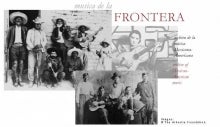Highlights from UCLA's collections: The Strachwitz Frontera Collection of Mexican and Mexican American Recordings

The Arhoolie Foundation's Strachwitz Frontera Collection is the largest repository of Mexican and Mexican-American commercial recordings in existence. The digitized recordings from the collection are available via UCLA's Digital Library and are divided, roughly by era, into three sections.
The early-twentieth century section includes approximately 20,000 78 rpm recordings of Mexican vernacular music recorded from circa 1905 to 1955. These performances document many types of popular lyric songs, including the first recordings of corridos, canciones, boleros, rancheras, and sones, as well as many types of instrumental music, including the first recordings of norteño and conjunto music. This section also includes spoken word performances, such as patriotic speeches and vernacular comedy skits. Many of the recordings are unique.
The late-twentieth century section contains approximately 14,000 45 rpm recordings dating from circa 1955 to the 1990s. These include recordings by a wide range of small regional record labels created to serve the musical interests of the growing immigrant population in the United States, especially along the U.S. / Mexico border.
The last section of the collection includes approximately 3,000 33 1/3 rpm recordings from circa 1955 to 1990, demonstrating the continuity of styles and regional traditions into contemporary times.
The non-profit Arhoolie Foundation was established in 1995 to document, preserve, present and disseminate authentic traditional and regional vernacular music. The Arhoolie Foundation owns the Frontera Collection, which consists of approximately 140,000 audio recordings on cassettes, 78 rpm, 45 rpm and 33 1/3 rpm long-playing (LP) records. Chris Strachwitz is the President of the Arhoolie Foundation and also the founder and president of Arhoolie Records.
In April 2013, the Arhoolie Foundation received grant funding from the Grammy Foundation and the National Endowment for the Humanities to continue the digital preservation of the Frontera Collection of Mexican American Records. As of April 2013, the Frontera project has already digitized over 90,000 recordings from 78s, 45s and audiocassettes. The new funding will allow them to digitize the LPs and master tapes in the collection. These will also ultimately be available online through the UCLA Digital Library’s Frontera website.
And according to a story in today's (June 28) Denver Post, it looks like the Frontera collection is growing. 12,000 records were donated to the Arhoolie Foundation by 85-year-old Carmen Juarez Beall, who worked as a disc jockey in the 1950s at KFSC, Colorado's first Spanish-language radio station. As tastes and technology changed and the recordings becamse obsolete to the radio station, Juarez Beall took them home. Juarez Beall's collection comprises roughly 7,000 45s, 3,000 78s and 2,000 LPs. Go to the Denver Post site to read the article and see a great photo of Chris Strachwitz sorting the collection.
Frontera is sponsored by the Los Tigres del Norte Fund at UCLA and the UCLA Chicano Studies Research Center, in collaboration with the Fund for Folk Culture. Additional funding has been provided by Arhoolie Records, the UCLA Library, the National Endowment for the Humanities, the National Endowment for the Arts, the Grammy Foundation, Lucasfilm Foundation and others.
If you have not already used Frontera, you need to check it out. You can browse the collection by Title, Label, Genre, Subject, Name, Performer and Composer. There is also an advanced seach section which adds Format as a searchable option. When you find what you want, click on "Complete Record." You can see scans of both sides of the discs and, of course, you can listen to the recording. Off-campus, the sound samples are limited to 50 seconds, but on-campus, or if you are a UC user, you can listen to the entire song. Remember, when using these materials from off-campus, UCLA Students, Staff, and Faculty will need to use either the UCLA VPN (Virtual Private Network) or the BOL Proxy Server to gain access. For information about UCLA Dial-up access, the BOL Proxy Server, the UCLA Wireless Network Access or UCLA Virtual Private Network.





